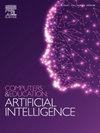Evaluation of early student performance prediction given concept drift
Q1 Social Sciences
Computers and Education Artificial Intelligence
Pub Date : 2025-01-23
DOI:10.1016/j.caeai.2025.100369
引用次数: 0
Abstract
Forecasting student performance can help to identify students at risk and aids in recommending actions to improve their learning outcomes. That often involves elaborate machine learning pipelines. These tend to use large feature sets including behavioral data from learning management systems or demographic information. However, this complexity can lead to inaccurate predictions when concept drift occurs, or when a large number of features are used with a limited sample size. We investigate the performance of different machine learning pipelines on a data set with change in study behavior during the Covid-19 period. We demonstrate that (i) LASSO, a shrinkage estimator that reduces complexity and overfitting, outperforms several machine learning models under these circumstances, (ii) a linear regression relying on only two handcrafted features achieves higher accuracy and substantially less predictive bias than commonly used, more complex models with large feature sets. Due to their simplicity, these models can serve as a benchmark for future studies and a fallback model when substantial concept or covariate drift is encountered.
求助全文
约1分钟内获得全文
求助全文
来源期刊

Computers and Education Artificial Intelligence
Social Sciences-Education
CiteScore
16.80
自引率
0.00%
发文量
66
审稿时长
50 days
 求助内容:
求助内容: 应助结果提醒方式:
应助结果提醒方式:


